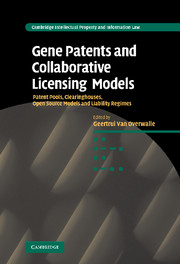 Gene Patents and Collaborative Licensing Models
Gene Patents and Collaborative Licensing Models from Part II - Clearinghouses
Published online by Cambridge University Press: 14 January 2010
Introduction
The Global Biodiversity Information Facility (GBIF) is an example of an information clearinghouse that focuses on biological diversity, primarily at the species and specimen levels. Although GBIF does contain some genetic information (especially about cultivars or varieties archived in living stock centres), it does not provide access to any patent data and all the information it provides is freely and openly available to all users. Therefore, GBIF does not provide a very apt model for gene patents. However, GBIF does provide some interesting lessons for how to assemble a distributed network of information.
Background
GBIF is an international organisation designed to make the world's biodiversity data freely and universally available via the Internet, for the benefit of science, society and a sustainable future. It was established in 2001 as a result of deliberations and discussions in the OECD's Global Science Forum.
However, GBIF is a free-standing organisation, not directly linked to the OECD or United Nations. It is based upon a unique Memorandum of Understanding, but has no formal standing in international law.
Inspirational models for the formation of GBIF included the International nucleotide sequence databases (GenBank, EMBL and DDBJ); Mexico's CONABIO (Comisión nacional para el conocimiento y uso de la biodiversidad); Costa Rica's INBio (Instituto Nacional de Biodiversidad); and Australia's ERIN (Environmental Resources Information Network). GBIF was able to build upon these pioneering national activities to develop its international approach.
To save this book to your Kindle, first ensure [email protected] is added to your Approved Personal Document E-mail List under your Personal Document Settings on the Manage Your Content and Devices page of your Amazon account. Then enter the ‘name’ part of your Kindle email address below. Find out more about saving to your Kindle.
Note you can select to save to either the @free.kindle.com or @kindle.com variations. ‘@free.kindle.com’ emails are free but can only be saved to your device when it is connected to wi-fi. ‘@kindle.com’ emails can be delivered even when you are not connected to wi-fi, but note that service fees apply.
Find out more about the Kindle Personal Document Service.
To save content items to your account, please confirm that you agree to abide by our usage policies. If this is the first time you use this feature, you will be asked to authorise Cambridge Core to connect with your account. Find out more about saving content to Dropbox.
To save content items to your account, please confirm that you agree to abide by our usage policies. If this is the first time you use this feature, you will be asked to authorise Cambridge Core to connect with your account. Find out more about saving content to Google Drive.